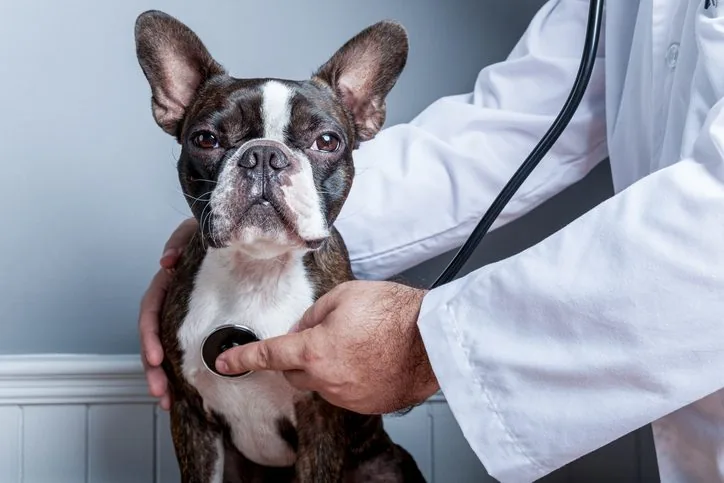6 Signs Your Pet Needs to See the Emergency Veterinarian in Chicago, IL

There are many instances in which a pet might need to see an emergency veterinarian. September is Responsible Dog Ownership Month, and part of responsible ownership is being aware of and prepared for situations that could constitute an emergency. Here are six common signs that your pet should visit West Loop Veterinary Care or a local 24-hour emergency veterinary hospital. Regardless of the situation, if you believe your pet is experiencing an emergency, seek immediate veterinary care.

1. Difficulty Breathing
Difficulty breathing is an emergency and requires immediate veterinary care. It can be caused by a variety of problems, including a blocked airway, respiratory illness, or other health problems.
Signs of difficulty breathing include panting or wheezing. Looking at your pet’s sides can help you detect rapid or shallow breathing patterns, which require immediate care. When you arrive at the veterinary hospital, let the staff know that your pet is having difficulty breathing.
If your pet is not breathing or has no pulse, immediately perform CPR and ask someone else to help you immediately transport your pet to the closest veterinary hospital.
2. Acute Injury
Many injuries require prompt veterinary care. These include hit-by-car, a bite from a dog or other animal, open wounds, or bleeding that is not easily stopped. If your pet has an altercation with another animal or a possible injury, check them over carefully. Bites and injuries can be difficult to detect, especially in longer-coated breeds. And remember, pets, especially cats, tend to hide their pain well.
3. Worsening of Chronic Illness
If your pet has a chronic illness, its health may deteriorate over time. Sometimes, their health can take a sudden and serious turn for the worse, requiring prompt veterinary care at West Loop Veterinary Care or at a local emergency veterinary hospital.
If your pet has a chronic illness, it’s important to have a plan in place before a serious situation arises. Your veterinarian can help tailor this plan given your pet’s needs, your budget, and time to administer care. This way, you can decide with your family how to proceed should your pet’s health deteriorate. Our veterinarians and team members at West Loop Veterinary Care are here to partner with you in the care of your pet at every stage of its life including wellness care, illness, hospice care, pain management, and euthanasia.
4. Ingestion of Foreign Object or Toxic Substance
If you see your pet ingest a foreign object, such as part of a toy, or if you suspect that they have swallowed a foreign object or food that could block their airway, check their mouth. If you can safely do so without getting bit, try to remove any object. If your pet is not breathing, you can attempt to perform the Heimlich maneuver to remove any such blockage and seek veterinary care immediately.
Even if your pet was able to completely swallow the foreign object and is able to breathe easily, they may face problems as a result of blockage of the digestive system. This may cause vomiting and can be fatal if left untreated.
Many foods, flowers, drinks, and medications that people consume are toxic to cats and dogs. Among the most common toxins are chocolate – which is toxic to both cats and dogs – and lilies, which are extremely toxic to cats. If your cat or dog ingests either of these items, contact West Loop Veterinary Care or a veterinary emergency center immediately. Typically, promptly addressing the problem results in better, less costly outcomes. If you are uncertain if an item is toxic to your pet, you can contact West Loop Veterinary Care or the ASPCA Animal Poison Control hotline to verify if the substance was toxic and what steps you should take to help your pet.
5. Severe Reaction to a Bite or Sting
If your pet has been bitten or stung by an insect such as a spider or bee or bitten by a snake, carefully check the site of the sting or bite. Remove the stinger and watch your pet for any reaction. It may be normal for your pet to have some pain and a little swelling at the site, but if the swelling starts to travel or if your pet’s face or snout swells, this is an emergency.
Your pet also needs to go to an emergency veterinarian after a bite or sting if they develop a fever or if their heart rate increases.
6. Severe Diarrhea and Vomiting
Finally, diarrhea and/or vomiting lasting for more than 3 days should also be treated as an emergency. Multiple bouts of diarrhea and/or vomiting are particularly concerning for puppies and kittens, senior pets and health compromised pets, all of whom can dehydrate very quickly. Dehydration can be life-threatening and requires immediate treatment.
If your adult pet has diarrhea or vomits once or twice and then seems to recover with no other symptoms, this may not be an emergency. You should watch them carefully for a day or two, but if everything goes back to normal, there’s no need to go to the emergency veterinarian in this situation.
West Loop Veterinary Care is Your Emergency Vet in Chicago, IL
This list only scratches the surface of potential pet emergencies. It is a good idea to be aware of other possibilities. Responsible pet ownership includes being prepared to provide not only wellness care for your pet but also to have resources or insurance for when your pet needs emergency care due to illness or an accident. Just like with people, all pets get sick and/or have emergencies during their lifetime.
We encourage pet owners to create an emergency fund specifically for their pet’s emergency medical needs or acquire pet insurance. This way, you will reduce the chance that financial decisions will impact the care you select for your pet in an emergency. Please be aware that many insurance policies require pet owners to pay upfront and seek reimbursement for care.
Should your pet have an emergency during our business hours, call West Loop Veterinary Care at 312-421-2275!
If we are closed, please reach out to the Veterinary Emergency Group or Premier Medical Group.
West Loop:
(312) 421-2275
Streeterville:
(312) 766-5959
